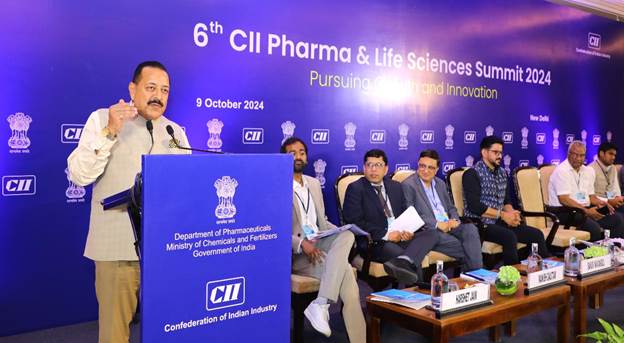New Delhi: The “Make in India” initiative is driving India’s push for self-reliance in pharmaceutical production, particularly in reducing dependency on imported Active Pharmaceutical Ingredients (APIs). By strengthening domestic manufacturing, India is ensuring a steady supply of critical healthcare products, said Dr. Jitendra Singh, Union Minister of State (Independent Charge) for Science and Technology, at the 6th CII Pharma & Life Sciences Summit: 2024.
Dr. Singh emphasized the importance of this summit as a platform for collaboration between industry leaders, government officials, and academia, showcasing India’s growing leadership in the global pharmaceutical and biotech sectors. “India has emerged as a hub for affordable, high-quality medicines, ranking 3rd globally in pharmaceutical production by volume and 14th by value,” Dr. Singh noted, while also highlighting the industry’s shift from a generic-based model to the development of biopharmaceuticals and biosimilars.
He added that Prime Minister Narendra Modi envisions India leading the next industrial revolution in biotech. Thanks to initiatives like the Production Linked Incentive (PLI) scheme, India is on course to becoming a global leader in biopharmaceuticals, bio-manufacturing, and life sciences by 2030.
One of the key achievements of India’s pharmaceutical sector is that every third tablet consumed globally is made in India, solidifying the country’s status as a vital player in the global healthcare market. Additionally, a recent survey by the Central Drugs Standard Control Organization (CDSCO) found the incidence of spurious drugs in India to be just 0.0245%, further underscoring the industry’s commitment to quality.
India’s leadership in global health is also evident in its development of groundbreaking vaccines. The country pioneered the world’s first DNA vaccine for COVID-19 and is leading efforts to produce the first Human Papilloma Virus (HPV) vaccine for adolescent girls, which will help prevent cervical cancer. Additionally, India is responsible for manufacturing 65% of the world’s vaccines, transforming health outcomes, particularly in low- and middle-income countries.
Dr. Singh pointed out that India’s bioeconomy has expanded 13-fold in the last decade, fueled by a thriving ecosystem of nearly 6,000 bio-startups. To maintain this momentum, the Minister urged the industry to continue investing in research and development (R&D), supporting young entrepreneurs, and fostering a robust startup ecosystem.
The creation of the Anusandhan National Research Foundation (ANRF), with a Rs 50,000 crore budget over five years, was lauded as a pivotal step in building a knowledge-driven society. By addressing infrastructure gaps in universities and promoting industry-academia collaborations, the ANRF will help propel advancements in sectors such as advanced materials, EV mobility, and health technology.





